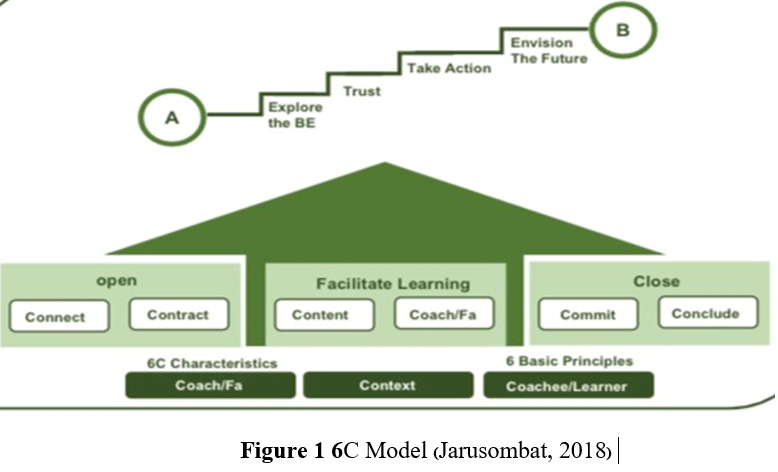Professional Development of Science and Mathematics Teachers through a Facilitative Coaching Process
Main Article Content
Abstract
This research aimed to clarify the Facilitative Coaching Process (FCP) in the workshop of teacher professional development. The FCP included the need for professional development of teachers, and teaching design of the FCP Science and Mathematics Teacher Professional Development Project. The subjects consist of the becoming a Facilitative Coach (FC) including 36 science and mathematics teachers who were working in the Chiang Mai Primary Educational Service Area Office 4 (CMPESAO 4), and 27 science and mathematics teachers who were working in science and math teachers under the Chiang Mai Primary Educational Service Area Office 1 (CMPESAO 1). The obtained information, then, was used as a database for teaching professional development training. This is one of the policies related to the promotion and development of teachers and educational personnel to provide quality learning management. The research method was carried during the workshop activities that were designed to examine utilizing worksheets on instructional design based on FCP principles and through observation and recording of participants' responses while engaging in the activities. The findings showed that this workshop's training approach assisted in preparing teachers to create lessons that would increase students' enthusiasm for learning and close the age gap between them and their students. Interestingly, the top three areas of professional knowledge that participants sought to develop the most were new information, innovative teaching techniques, and integrated teaching. The CMPESAO1 teachers concentrated on reinforcement strategies, whereas the CMPESAO4 teachers concentrated on using teaching aids.
Article Details

This work is licensed under a Creative Commons Attribution-NonCommercial-NoDerivatives 4.0 International License.
References
Bharat, S., Ratchadan K. (2010). N.Y.A model for the development of the competence of professional teachers in the school is affiliated with the Chiang Mai Elementary School district Office. District 2.
Boonploy, M. (2009). Development of student-type learning behavior in the CSE399 instruction set writing practice course. By using reinforcement techniques. Retrieved August 23, 2018 from https://www.spu.ac.th/tlc/files.Maliwan-CSE399P.52.pdf.
Bredeson. Designs for Learning: A New Architecture for Professional Development in Schools; 2003. Retrieved August 24, 2018 from https://eric.ed.gov/?id=ED471571
Chakraborty, U. (2014). Teacher professional competence development. Journal of Research and Development Suan Sunandha Rajabhat University. 8(1); 35-43.
Chander, A. (2014). 6 Essential Skills of an Effective Facilitator. Retrieved August 24, 2018 from https://www.linkedin.com/pulse/ 20140619061555-1334077-6-essential- skills-of-a-effective-facilitator.
Chiang Mai Primary Educational Service Area Office 1. (2018). S.P.C. Order No. 217/2018 on the establishment of a Committee for the Development of Teachers for Mathematics and Science. In the directorate/support of facilitation learning.
Chiang Mai Primary Educational Service Area Office 4. (2017). Government Letter No. 04050/3214. Courtesy of the speakers in teacher training according to the development project. Potential teachers to teach mathematics and science. Secondary school level. Retrieved December 24, 2017 Policy 60. Basic Education Fiscal 2018. from https://docs.google.com/viewer?a=v&pid=sites>srcid=b WhzMS5nby50aHxtaHMwMXxneDoxN2Q0OTljMTgyNzZhM2Rl.
Creswell, J. W., & Clark, V. L. P. (2017). Designing and conducting mixed methods research: Sage publications.
Desimone, L. M. (2023). Rethinking teacher PD: a focus on how to improve student learning, Professional Development in Education, 49:1, 1-3, DOI: 10.1080/19415257.2023.2162746
Ethiophithon, T. (2020). How will humans build new skills, learning, to cope with 'change' in the future? Retrieved August 20, 2020.
Jaffe, D. T. & Scott, C. D. (1998). Take this job and love it. New York: Simon & Schuster, 116-117.
Janelle, C. (2018). Top 5 Teaching Strategies. Retrieved September 24, 2018 from http://www.Teachhub.com/top-5-teaching-strategies.
Jarusombat, T. (2018). The Right Life in Coach, and Fa. Bangkok.
Jim Knight. (2021). Instructional Coaching. Retrieved April 24, 2023 from https://www.instructional coaching.com/category/impact-cycle/.
Knight, J. (2021). Three Approaches to Coaching. Retrieved April 24, 2023 from https://www.instructionalcoaching.com/blog/three-approaches-to-coaching.
Institute for the Promotion of Teaching Science and Technology. (2018). FOCUS ISSUES FROM PISA 2015. No. 29.
Khammani, T. (2017). Pedagogical Science: Cognitive to organize an effective learning process. Bangkok: Chulalongkorn University Press.
Kindergarten in Muang Mai Chonburi. (2018).Research and development of professional teacher competency models using: Integrated learning processes for international standard schools . Retrieved August 23, from http://www.mmc.ac.th/images/sub1413789281/Professional Teacher Articles.pdf.
Ministry of Education. (2009). Core Curriculum of Basic Education. Bangkok: Agricultural Cooperative Publishing House of Thailand Ltd.
Meelue, P. (1997). A study of teacher-researcher competency. Thesis, M.Ed. (Educational Research). Bangkok: Graduate School Chulalongkorn University. Photocopy.
National Strategy 20 years. (2018). Announced in the Royal Gazette 2018 – 2037.1st edition published. Retrieved August 23, 2018 from https://www.sepo.go.th/assets/document/file/NationalStrategic Plan %2020%20years%20.pdf.
Ngsawat, A. et al. (2009). The relief of professional aptitude: The research was funded by the National Bureau of Educational Testing (Public).
OECD. (2009). Teacher evaluation: A conceptual framework and examples of country practices. In the OECD Review on Evaluation and Assessment Frameworks of Improving School Outcomes. Retrieved August 24, 2018 from http://www.oecd.org/pdf.
Office of the Basic Education Commission. (2008). Core Learning Indicators and Strands, Science Learning Strand. Bangkok: Agricultural Cooperative Assembly Printing House of Thailand Co., Ltd.
Office of the Basic Education Commission. (2016). A practical handbook driving education reform of the Ministry of Education in the region. Bangkok: Ministry of Education.
Queensland University of Technology. (2002). The Thailand Education Reform Project. Retrieved September 24, 2018 from http://www.edthai.com/publication/0005/fulltext.pdf.
Pahea,S. (2010). Professional development of teachers in the second decade. Nakhon Prae Hotel Township Prairie Elementary School District Office 2.
Rakwijitkul, N. (2017). Teacher Professional Development. Journal of Education. Mahasarakham University, 11(1); 21-33.
Royal Academy. (2017). Dictionary of Contemporary Lexicography, Royal Edition. Bangkok: Samnak Ngong Royal Academy.
Srisamrit, K. (2013). A professional development model to enhance the child's teachers' fitness, experience, and psychological skills. Childhood. Ph.D., Graduate School, Silpakorn University, Nakhon Pathom.
Chitrasai, V. (2012). Capacity Development of Facilitators 2012. Retrieved August 25, 2018 from http://61.19.73.142/km/?p=171.
Rajuptook, W. (2020). Thai Children's Competencies in a VUCA World Thai Learners' Key Competencies in a VUCA World. Khurusapha witthajarn Journal of Teacher Professional Development, 1 (1).


